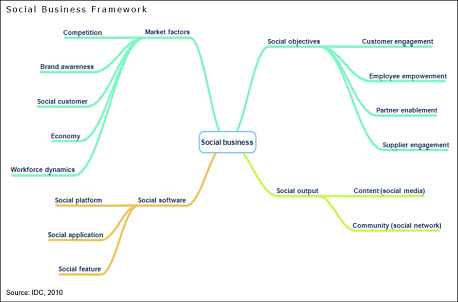IDC offers an impartial social business framework

We can hardly overstate the importance of communication and collaboration in running successful programs and projects. In plain English, most organizations are rife with information silos and internecine warfare, all of which leads to screwed-up projects.
Social software offers tremendous value within the context of traditional project management, which makes it important subject matter for this blog.
Social software as a category is relatively new and wildly popular, at least among consumers; Facebook for example, recently passed 500 million users. With such intense levels of consumer interest, it is not surprising that social tools are also gaining popularity in business.
As with any new category, many vendors exaggerate the capabilities of their social products while consulting companies develop self-serving frameworks that emphasize whatever they happen to sell. While all this testifies to the vibrancy of the social business market, it presents a challenge to those trying to understand the category and its implications.
The social business analyst team at IDC, led by Michael Fauscette, has stepped in to fill the need for an impartial framework, and currently offers its document as a free download. This image shows the IDC social business framework:
The IDC document explains the framework:
These four elements are key to a social business transition and are symbiotic in their relationship. As a practical matter, the process of implementing any social business initiative or project should follow these steps:
- Identify the market factors that are generating the need for change.
- Recognize the social objectives that you want to accomplish and why it's important.
- Establish the social outputs that will be used to support the objectives.
- Determine which platforms, applications, and/or features will be needed to create the desired outputs.
My take. Social business is an important and growing trend with beneficial implications for many parts of the traditional organization. For this blog, which focuses narrowly on enterprise software-related efficiency and success, social tools hold great promise.
Project and portfolio strategy should never be divorced from broader organizational goals and objectives. For this reason, it is important for IDC, and other analysts, to continue refining the role of social software in business processes across the enterprise.
Disclosure: IDC is an Asuret client.
